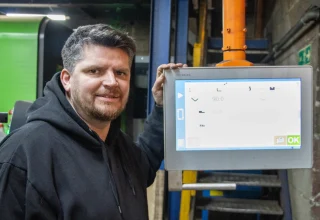
The head of Britain’s manufacturers calls for a reset of the UK’s political and trading relationship with the EU and an end to the rancour and political chaos of the last few years.
Conference speech calls for end to rancour and industrial strategy to boost growth
Addressing the Make UK National Manufacturing Conference at the QE2 Centre in Westminster, CEO, Stephen Phipson also called on the Government to commit to an industrial strategy, in particular stepping up efforts to secure the future of the UK automotive industry through enabling battery capacity, as well as ending the procrastination on the Small Modular Reactor programme as part of the Government’s commitment to clean energy.
On the relationship with the EU, Stephen Phipson:
“While the unity of the response towards Ukraine has eased some of the tensions with the EU, the political mismanagement of our economy and, damage to the reputation of the UK as a partner on such a grand scale, together with the disregard of the rule of law in our political system cannot continue.
“We need to reset our political and trading relationship with the EU which has been marked by such rancour. I want to applaud the positive approach taken by the Prime Minister which shows what can be achieved when you work pragmatically and collaboratively, rather than thumping the table or issuing threats.
“Hopefully the agreement reached last week will be the beginning of a new chapter whereby the UK and EU can jointly focus on deepening cooperation through the TCA, finding mechanisms to solve current disruptions in trade, as well as building a framework that benefits businesses and boosts growth on both sides.”
On Industrial Strategy, :
“We need a coherent industrial strategy that takes a long term view. Industrial Strategy is not just about tax incentives that last for eighteen months or so, welcome though they are, but it is about our overall national capability. It must safeguard our existing strengths in sectors such as aerospace, defence and automotive while laying out how we are going to decarbonise key foundation industries such as steel. At the same time, it must set out a national vision for the UK to be a science superpower.
“Secondly, as well as this investment in science, technology and research we need all parts of Government commit to a world class system of technical and vocational education. This must start with a fundamental reform of the Apprentice Levy as well as a proper funding of Further Education to support the needs of employers. While funding must be provided at a national level skills should be devolved to the Regions who know best how to match the skills needs with the requirements of local employers.
“Crucially all Government departments must acknowledge the vision as a priority and, put their shoulder to the wheel. Every policy should be measured against its impact on the economy and national vision of the UK as a science superpower whilst, ideally, the Government would also be held accountable in Parliament through an annual Statement as to how it is performing against key metrics.”
On electric vehicle capacity and the Small Modular Reactor programme, Stephen Phipson:
“At the farthest end of the scale there is an urgent need to encourage battery capacity in the UK if we are to keep our automotive sector, one of the jewels in our manufacturing crown.
“For many years I have been telling Government that the UK needed a strategy to enable the transition of the sector and its supply chain from making combustion engines to electric but those warnings have gone unheeded. It is not too late but, with the Chief Executives of some of the major OEMs issuing warnings recently about the UK’s competitiveness in this area we are in the last chance saloon.
“Furthermore, to aid our clean energy transformation Government should end the procrastination on and, commit to, the Small Modular Reactor programme. As well as enabling cleaner power for the UK, this programme also offers tremendous export potential and is an area where the UK is genuinely world leading.”













